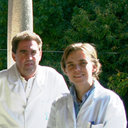Blockade by nanomolar resveratrol of quantal catecholamine release in chromaffin cells.
Parole chiave
Astratto
The cardiovascular protecting effects of resveratrol, an antioxidant polyphenol present in grapes and wine, have been attributed to its vasorelaxing effects and to its anti-inflammatory, antioxidant, and antiplatelet actions. Inhibition of adrenal catecholamine release has also been recently implicated in its cardioprotecting effects. Here, we have studied the effects of nanomolar concentrations of resveratrol on quantal single-vesicle catecholamine release in isolated bovine adrenal chromaffin cells. We have found that 30 to 300 nM concentrations of resveratrol blocked the acetylcholine (ACh) and high K(+)-evoked quantal catecholamine release, amperometrically measured with a carbon fiber microelectrode. At these concentrations, resveratrol did not affect the whole-cell inward currents through nicotinic receptors or voltage-dependent sodium and calcium channels, neither the ACh- or K(+)-elicited transients of cytosolic Ca(2+). Blockade by nanomolar resveratrol of secretion in ionomycin- or digitonin-treated cells suggests an intracellular site of action beyond Ca(2+)-dependent exocytotic steps. The fact that nanomolar resveratrol augmented cGMP is consistent with the view that resveratrol could be blocking the quantal secretion of catecholamine through a nitric oxide-linked mechanism. Because this effect occurs at nanomolar concentrations, our data are relevant in the context of the low circulating levels of resveratrol found in moderate consumers of red wines, which could afford cardioprotection by mitigating the catecholamine surge occurring during stress.


